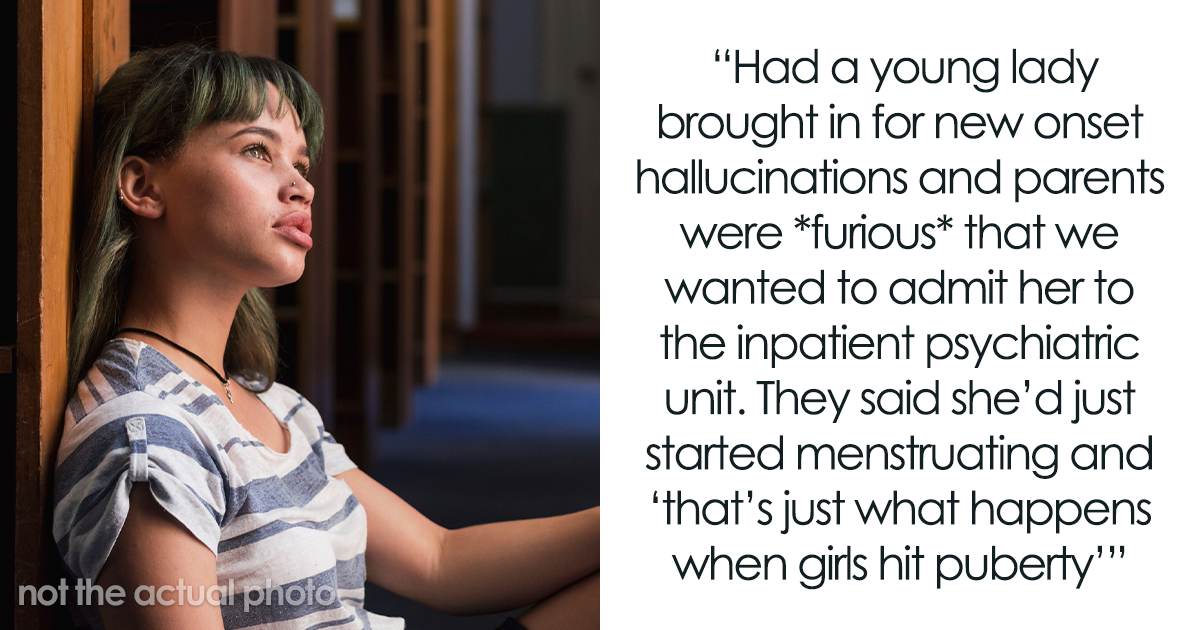Sometimes what patients or their families consider “normal” can catch healthcare professionals completely off guard. Take the case of today’s Original Poster (OP), whose patient’s family believed their child’s prolonged sleeping after being in anesthesia was normal, not knowing there was something deeper at play.
The OP then prompted netizens to share their most surprising experiences with patients insisting that unusual or alarming symptoms were perfectly normal. The stories range from shocking medical reactions to situations that left staff questioning how certain behaviors were ever considered ordinary. Together, they provide a fascinating look at the moments when “normal” is anything but.
More info: Reddit

 Had a young lady brought in for new onset hallucinations while at a friend’s house and parents were *furious* that we wanted to admit her to the inpatient psychiatric unit. They said she’d just started menstruating and “that’s just what happens when girls hit puberty”. Our MD was quick to point out that hallucinations were not, in fact, a normal part of puberty…
Had a young lady brought in for new onset hallucinations while at a friend’s house and parents were *furious* that we wanted to admit her to the inpatient psychiatric unit. They said she’d just started menstruating and “that’s just what happens when girls hit puberty”. Our MD was quick to point out that hallucinations were not, in fact, a normal part of puberty…
Turns out, there was a family history of acute intermittent porphyria, which can in fact cause hallucinations with hormonal changes! So, in their family, hallucinations were a normal part of puberty!
 Mine was from my daughter. She thought it was normal to get dizzy and grey out for a few seconds when standing. After puberty, she started completely passing out and falling, and commented that it was weird because she usually just blacks out. Um… what?!? Once we started monitoring it, her BP was 50s/30s during some of her “normal” episodes when she didn’t lose consciousness and just became dizzy with vision loss. She said she’d been doing that for several years.
Mine was from my daughter. She thought it was normal to get dizzy and grey out for a few seconds when standing. After puberty, she started completely passing out and falling, and commented that it was weird because she usually just blacks out. Um… what?!? Once we started monitoring it, her BP was 50s/30s during some of her “normal” episodes when she didn’t lose consciousness and just became dizzy with vision loss. She said she’d been doing that for several years.
 Someone complained of shoulder pain, but didnt mention anywhere on the paper work they LOST THEIR ARM and had it reattached in a farming accident 20 years ago. I saw the scar and that triggered additional questions from me that prompted him to mention this casually.
Someone complained of shoulder pain, but didnt mention anywhere on the paper work they LOST THEIR ARM and had it reattached in a farming accident 20 years ago. I saw the scar and that triggered additional questions from me that prompted him to mention this casually.
PsychoTricks explains an interesting phenomenon called the “normalcy bias,” where people tend to downplay or ignore potential dangers, assuming that things will continue as they always have or that nothing is serious as they pose to be. However, they explain that his mindset can make people dismiss warnings or delay action during crises.
They also highlight that bias typically unfolds in three stages, which are denial, deliberation, and eventual action, but by the time people reach the final phase, it’s often too late to respond effectively. Essentially, normalcy bias prevents people from recognizing the seriousness of a threat until the consequences are unavoidable.
 Had a heavy cycle patient tell me it was normal for her to be bed ridden for a week after her period and that all the women in her family were like that. When I asked about volume of menstrual cycle she said she’d never measured but that she wore adult diapers and changed them EVERY TWO HOURS.
Had a heavy cycle patient tell me it was normal for her to be bed ridden for a week after her period and that all the women in her family were like that. When I asked about volume of menstrual cycle she said she’d never measured but that she wore adult diapers and changed them EVERY TWO HOURS.
 RN here- I was discussing morning care with an elderly patient and offered to get her a toothbrush and toothpaste. Sure thing. Then she very casually remarked that “even after all these years, she still hasn’t gotten used to the itchy numbness and moderate lips and tongue swelling that happens (and has been happening her whole life) whenever she brushes her teeth.”
RN here- I was discussing morning care with an elderly patient and offered to get her a toothbrush and toothpaste. Sure thing. Then she very casually remarked that “even after all these years, she still hasn’t gotten used to the itchy numbness and moderate lips and tongue swelling that happens (and has been happening her whole life) whenever she brushes her teeth.”
I kinda thought she was being a little dramatic about the peppermint taste of the toothpaste until she straight up had angioedema before she even finished brushing. She had great dental hygiene though. It’s [annoying] having to silently deal with something you don’t even know is a thing. We called her husband and sent him out to buy her some natural toothpaste and all was right again on the unit.
 Had a pt who was post-op from a regular procedure. Her hand at the wrist looked like a Tetris piece. I asked her about it and she says, “Oh yeah. I went for a CT and had a tumble. It swelled up but I put some ice on it until the swelling went away. It doesn’t really hurt anymore. Should I get an x ray?”.
Had a pt who was post-op from a regular procedure. Her hand at the wrist looked like a Tetris piece. I asked her about it and she says, “Oh yeah. I went for a CT and had a tumble. It swelled up but I put some ice on it until the swelling went away. It doesn’t really hurt anymore. Should I get an x ray?”.
In this context, we can then see that patients or their parents may sincerely view concerning symptoms as harmless, but this is due to psychological and perceptual factors. According to Positive Reset, this happens when ordinary bodily sensations or mild discomforts are misread as non-serious, especially if past experiences with similar symptoms didn’t lead to major issues.
They note that limited health knowledge can also reinforce this false sense of reassurance. Since the body frequently produces sensations that feel unpleasant but aren’t dangerous, people may grow accustomed to overlooking them, mistakenly assuming that every unusual feeling is just part of their “normal.”
 The amount of adult children who thought it perfectly acceptable their demented parents “take care of each other” with zero assistance was a good reason why I left the ER. Pretty sure one of my coworkers called APS on a case like that it was so bad.
The amount of adult children who thought it perfectly acceptable their demented parents “take care of each other” with zero assistance was a good reason why I left the ER. Pretty sure one of my coworkers called APS on a case like that it was so bad.
 My own : i played a bunch of sports growing up, but I was hot garbage at running distances. Most of my sports were short bursts (baseball, softball, football). I did basketball for a handful of seasons, but always felt like I was dying after 4 or 5 minutes. The only sustained activity I could do was swim team. I just assumed i was out of shape, which was b******t because I was absolutely not.
My own : i played a bunch of sports growing up, but I was hot garbage at running distances. Most of my sports were short bursts (baseball, softball, football). I did basketball for a handful of seasons, but always felt like I was dying after 4 or 5 minutes. The only sustained activity I could do was swim team. I just assumed i was out of shape, which was b******t because I was absolutely not.
In my late 20s, I decided to start biking to work, and realized over an hour after sitting at my desk, I still couldn’t take a deep breath without coughing, and I was hacking up multiple globs of mucus. Yeah, I have exercise-induced asthma. Hot+humid is best for my lungs, cold and dry is worst. So shoveling always made me want to die, but swimming in an indoor pool was absolutely fine. But now, I really am fat and out of shape lol.
 Not quite the same, but we had a kiddo with really profound craniofacial abnormalities whose eyeballs would pop out of her sockets every time she sneezed. Mom was totally unfazed by this- would just wash her hands and pop em back in. Obviously mom knew it wasn’t objectively normal, but it was amazing how it was very obviously this family’s normal.
Not quite the same, but we had a kiddo with really profound craniofacial abnormalities whose eyeballs would pop out of her sockets every time she sneezed. Mom was totally unfazed by this- would just wash her hands and pop em back in. Obviously mom knew it wasn’t objectively normal, but it was amazing how it was very obviously this family’s normal.
In fact, Stepcare emphasizes that downplaying symptoms as “normal” is a common thing in today’s world, although not the best, as it can lead to delayed diagnosis and treatment. They further note commonly ignored symptoms like sudden confusion or personality changes, persistent fever lasting more than a week, unexplained bleeding or weight loss, and severe, sudden headaches.
They point out that other red flags, like frequent infections, slow healing, or noticeable changes in bowel or urinary habits, are often minimized as routine issues. And in the case of the OP, even rare conditions such as enzyme deficiencies affecting medication metabolism can go unnoticed when patients assume their reactions are typical.
 Student was referred to me for suspected substance a***e. Assessed them and noticed their eyes weren’t dilating. After further assessment determined the kid was just tired and their eyes legit don’t dilate. Weird.
Student was referred to me for suspected substance a***e. Assessed them and noticed their eyes weren’t dilating. After further assessment determined the kid was just tired and their eyes legit don’t dilate. Weird.
 A mom slept for 2 days not feeling well. Family wasn’t worried until she wouldn’t wake up to any stimuli. Blood sugar 1734.
A mom slept for 2 days not feeling well. Family wasn’t worried until she wouldn’t wake up to any stimuli. Blood sugar 1734.
 I had chest pain with physical exertion that would stop when I rested. Weight lifting and other non-cardio workouts were fine but I couldn’t run for longer than 10 minutes without the chest pain returning and having a bit of a hard time catching my breath. I went to the emergency room a few times growing up with these complaints and they’d always do an EKG, angiogram, echo, and MRI. They said I had a mild heart murmur. At 22 I presented post cardiac arrest while riding my bike to work on campus. After rechecking they found that I had anomalous left coronary artery from the pulmonary artery. It’s a very rare birth defect, 1 in every 300,000 live births has it, only 1 in 10 survive past infancy if it’s caught before the infant goes into cardiac arrest.
I had chest pain with physical exertion that would stop when I rested. Weight lifting and other non-cardio workouts were fine but I couldn’t run for longer than 10 minutes without the chest pain returning and having a bit of a hard time catching my breath. I went to the emergency room a few times growing up with these complaints and they’d always do an EKG, angiogram, echo, and MRI. They said I had a mild heart murmur. At 22 I presented post cardiac arrest while riding my bike to work on campus. After rechecking they found that I had anomalous left coronary artery from the pulmonary artery. It’s a very rare birth defect, 1 in every 300,000 live births has it, only 1 in 10 survive past infancy if it’s caught before the infant goes into cardiac arrest.
Still, as in the case of the OP, some patients are aware of the conditions and may choose to withhold important health information from doctors for a variety of reasons. The Pharmaceutical Journal notes that common factors include fear of judgment, embarrassment, being lectured, as well as a desire to maintain autonomy over their care.
Some patients may also avoid sharing details because they distrust the doctor’s attitude, want additional tests first, or believe the information is irrelevant. However, these behaviors can complicate diagnosis and treatment, highlighting the importance of trust and open communication in healthcare.
 Not a patient experience, but from my wife. She has a severe nut allergy and was hospitalized a few times. When she had pine nuts on accident when she was a teen, she went mostly deaf and had tunnel vision and swelling throat as part of anaphylaxis. She was just talking to the EMTs like in a normal conversation. No panic, no nothing. Just trying to tell them what happened all calm-like but can’t hear or see or make intelligible sounds.
Not a patient experience, but from my wife. She has a severe nut allergy and was hospitalized a few times. When she had pine nuts on accident when she was a teen, she went mostly deaf and had tunnel vision and swelling throat as part of anaphylaxis. She was just talking to the EMTs like in a normal conversation. No panic, no nothing. Just trying to tell them what happened all calm-like but can’t hear or see or make intelligible sounds.
They were just floored that she was so calm.
 I asked a patient if she had any urinary trouble during a postpartum visit. She replied, “Nope! I set alarms to make sure I pee before my bladder gets too full and I pee myself, but I know that happens after having a baby so it’s all good!”
I asked a patient if she had any urinary trouble during a postpartum visit. She replied, “Nope! I set alarms to make sure I pee before my bladder gets too full and I pee myself, but I know that happens after having a baby so it’s all good!”
I gently informed her that it was not all good and we discussed pelvic floor PT, which she was thrilled about!
 I slept for an additional 6hr after having what should have been an abbreviated outpatient procedure….When the nurses kept checking on me, all concerned, my husband just said, “Let her sleep. She works nights and takes care of our 3 kids when she’s not working.” God bless him. ❤️.
I slept for an additional 6hr after having what should have been an abbreviated outpatient procedure….When the nurses kept checking on me, all concerned, my husband just said, “Let her sleep. She works nights and takes care of our 3 kids when she’s not working.” God bless him. ❤️.
At the heart of these stories, what seems “normal” to one person may not necessarily be. These anecdotes aren’t just entertaining; they also highlight the importance of paying attention, asking questions, and understanding context when it comes to health and medicine.
Some patients and families shrug off unusual reactions, others underestimate risks, and some simply don’t realize the significance of what they’re describing. Reading through these experiences is a reminder that perspective matters, and that what one person calls normal can be eye-opening, shocking, or downright dangerous.
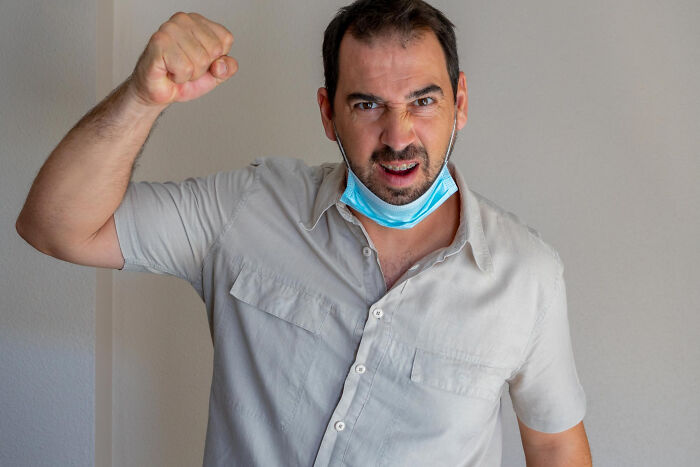 My dad would become psychotic and combative from etomodate. The second time it happened, an ER was trying to put his shoulder back into place. We tried to warn them and offered to stay as we could usually calm him, but they refused. It took five people to restrain him, and they ended up pulling his shoulder back out of place and destroying his rotator cuff in the process.
My dad would become psychotic and combative from etomodate. The second time it happened, an ER was trying to put his shoulder back into place. We tried to warn them and offered to stay as we could usually calm him, but they refused. It took five people to restrain him, and they ended up pulling his shoulder back out of place and destroying his rotator cuff in the process.
We mentioned to the hospitals in that system multiple times about the etomodate issue, but they would never note in his chart or on his allergy and reaction info. I was finally like “Well, if he beats the s**t out of you, don’t say we didn’t warn you.”.
 I had a male patient tell me urinating once a day was normal for him. He would wake up every morning and urinate 3-3.5 liters then never pee again the rest of the day.
I had a male patient tell me urinating once a day was normal for him. He would wake up every morning and urinate 3-3.5 liters then never pee again the rest of the day.
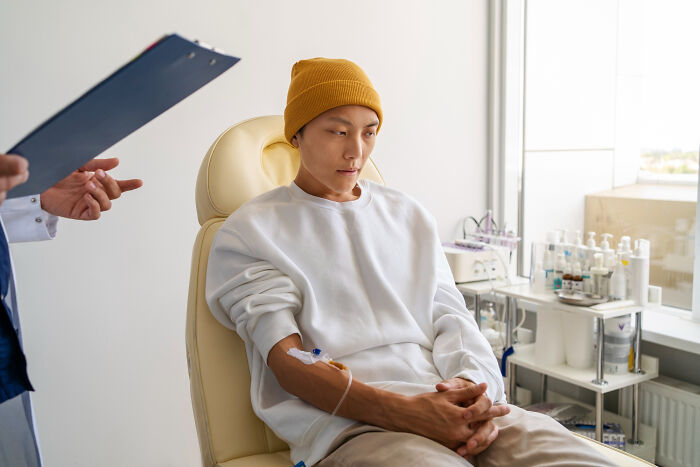 My husband was recently admitted with sepsis. He fought me about even going in. At one point in the ED I mentioned that I was concerned about his rapid respiratory rate and he said he just needed to tell himself to slow his breathing. 😒.
My husband was recently admitted with sepsis. He fought me about even going in. At one point in the ED I mentioned that I was concerned about his rapid respiratory rate and he said he just needed to tell himself to slow his breathing. 😒.
 Way too many people think bleeding through their b******e is normal. Sure, it could be hemorrhoids, but it could also be cancer. Check in with your doctor. .
Way too many people think bleeding through their b******e is normal. Sure, it could be hemorrhoids, but it could also be cancer. Check in with your doctor. .
 I recently had a patient with a hx of conversion disorder, unknown to our team. Patient is new to the state, transfer of medical record nonsense. Two days in a row, dayshift called a level one stroke alert on this patient because they went completely catatonic. BP was dropping, pacer was switching between A-paced and AV-paced (it was interrogated and nothing was wrong with it). CT and other workup was negative. The tele-health stroke neurologist wanted to ship the patient to get a full work up, ship the patient to a tertiary facility for a pacemaker safe MRI and continuous EEG. When dayshift contacted the son, he was PIIIIISSED. He said “We aren’t doing this again. Just send her over to ~facility 45 min away~. She’s been there a few times this month and they said she just plays dead for a while when she’s sick.” She did in fact “wake up” 2 hours into my shift requesting a carton of milk and said “oh man, it happened twice in two days. That probably scared you guys.”.
I recently had a patient with a hx of conversion disorder, unknown to our team. Patient is new to the state, transfer of medical record nonsense. Two days in a row, dayshift called a level one stroke alert on this patient because they went completely catatonic. BP was dropping, pacer was switching between A-paced and AV-paced (it was interrogated and nothing was wrong with it). CT and other workup was negative. The tele-health stroke neurologist wanted to ship the patient to get a full work up, ship the patient to a tertiary facility for a pacemaker safe MRI and continuous EEG. When dayshift contacted the son, he was PIIIIISSED. He said “We aren’t doing this again. Just send her over to ~facility 45 min away~. She’s been there a few times this month and they said she just plays dead for a while when she’s sick.” She did in fact “wake up” 2 hours into my shift requesting a carton of milk and said “oh man, it happened twice in two days. That probably scared you guys.”.
 I did health lodge check-in’s at Scout camp; we intentionally had everybody scheduled to go for swim tests right after they saw us so they were in bathing suits when they came in, but it was also so we could eyeball kids for signs of a***e without asking in front of everybody else in line. We had everybody’s health forms with H&P from their PCPs before they arrived.
I did health lodge check-in’s at Scout camp; we intentionally had everybody scheduled to go for swim tests right after they saw us so they were in bathing suits when they came in, but it was also so we could eyeball kids for signs of a***e without asking in front of everybody else in line. We had everybody’s health forms with H&P from their PCPs before they arrived.
So this Scoutmaster comes in with an obvious comparatively recent median sternotomy scar and chest tube scars. I blinked, said to myself, Hmmm, I didn’t see that on his health form, and looked again. Nope, not there. So I asked, “Did you have open heart surgery?”
“Oh yeah, I had an aortic valve replacement after I saw him.” On cardiac meds, etc., etc., also not on health form …
And you didn’t think to mention this as potentially significant at camp? Oy.
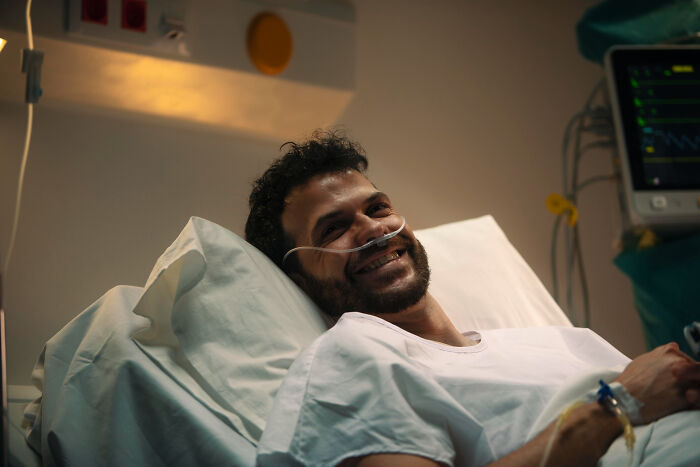 I was similar as a kid. After general anesthesia I’d sleep for 12-24 hours. My parents would routinely warn medical staff, and it was one of the biggest things they told my husband when we married. It got worse the older I got, nearly 30 hours asleep at 18 after a minor ear procedure. I’m generally fairly sensitive to things such as [relaxing medication] and [anti-allergy medication]. I’d take 0.25 mg of [relaxing medication] and sleep for 20+ hours. Half a normal [anti-allergy medication] puts me out 12+.
I was similar as a kid. After general anesthesia I’d sleep for 12-24 hours. My parents would routinely warn medical staff, and it was one of the biggest things they told my husband when we married. It got worse the older I got, nearly 30 hours asleep at 18 after a minor ear procedure. I’m generally fairly sensitive to things such as [relaxing medication] and [anti-allergy medication]. I’d take 0.25 mg of [relaxing medication] and sleep for 20+ hours. Half a normal [anti-allergy medication] puts me out 12+.
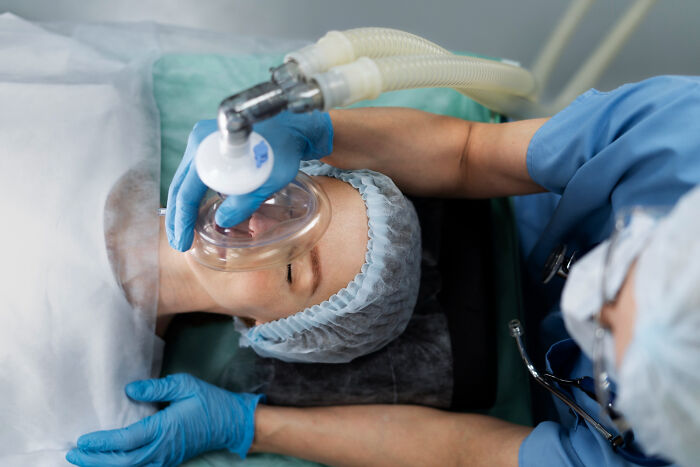 I’m the opposite problem but I always make sure I let everyone taking care of me know that whatever anesthesia you think is going to keep me out will probably only keep me out for about half or less of your planned time. I woke up during my gallbladder removal and my first colonoscopy, but only because they didn’t really listen to me when I told them before the second one…
I’m the opposite problem but I always make sure I let everyone taking care of me know that whatever anesthesia you think is going to keep me out will probably only keep me out for about half or less of your planned time. I woke up during my gallbladder removal and my first colonoscopy, but only because they didn’t really listen to me when I told them before the second one…
poor kid though, must be rough if everything knocks you out for a thousand times longer because your body can’t process it quickly.
 We had a patient in the ICU that was unresponsive, ended up on a ventilator and remained unresponsive. They were trying to figure out what was causing her condition. Her husband would come in with their two small children and just stand there with a flat affect, no emotion whatsoever at the end of the bed. The second day she was there the nurse said to him that it might be best for their kids if they weren’t there seeing their mother like that. His reply was “they’ve seen her worse than this.” Huh? Worse? The interactions with him were very strange.
We had a patient in the ICU that was unresponsive, ended up on a ventilator and remained unresponsive. They were trying to figure out what was causing her condition. Her husband would come in with their two small children and just stand there with a flat affect, no emotion whatsoever at the end of the bed. The second day she was there the nurse said to him that it might be best for their kids if they weren’t there seeing their mother like that. His reply was “they’ve seen her worse than this.” Huh? Worse? The interactions with him were very strange.
 Nobody believes me when I say I have a paradoxical reaction to [allergy medication] and will turn into a toddler until I’m [bare] and ranting about the Power Rangers while constantly falling off the bed. That was my last allergic reaction, asked for my husband to come back because he can distract me enough until my facial swelling goes down. They brought him back eventually. I have almost no memory of this. And I have no idea why I always strip naked when I’m on [allergy medication] of any sort. I know it’s necessary for the allergic reaction but I’m also warning staff and it’s always dismissed until I blackout and start monologues about things I don’t care about (different color carrots, power rangers, MySpace, calluses, sun bears, etc.).
Nobody believes me when I say I have a paradoxical reaction to [allergy medication] and will turn into a toddler until I’m [bare] and ranting about the Power Rangers while constantly falling off the bed. That was my last allergic reaction, asked for my husband to come back because he can distract me enough until my facial swelling goes down. They brought him back eventually. I have almost no memory of this. And I have no idea why I always strip naked when I’m on [allergy medication] of any sort. I know it’s necessary for the allergic reaction but I’m also warning staff and it’s always dismissed until I blackout and start monologues about things I don’t care about (different color carrots, power rangers, MySpace, calluses, sun bears, etc.).
 I work in an ambulatory center and had a family tell me their 6 year old spikes a 102-103F fever at least once or twice a day for no known reason, he had full work ups with specialists and they still couldn’t find out why so they were hoping having his tonsils out would help. We had to cancel him bc how would we know if he was randomly spiking a temp or if it was MH…I felt bad but that was absolutely something that needed to be done in hospital setting.
I work in an ambulatory center and had a family tell me their 6 year old spikes a 102-103F fever at least once or twice a day for no known reason, he had full work ups with specialists and they still couldn’t find out why so they were hoping having his tonsils out would help. We had to cancel him bc how would we know if he was randomly spiking a temp or if it was MH…I felt bad but that was absolutely something that needed to be done in hospital setting.
 I’m the opposite and wake up on the table. D**n red head gene. Tbf , I’ve forgotten to tell them that I have hemophilia.
I’m the opposite and wake up on the table. D**n red head gene. Tbf , I’ve forgotten to tell them that I have hemophilia.
 Peds PACU here…parents lie on purpose or omit things because of low IQ levels all the time. Illnesses, autism, allergies, etc. haven’t heard this one though!
Peds PACU here…parents lie on purpose or omit things because of low IQ levels all the time. Illnesses, autism, allergies, etc. haven’t heard this one though!
Also, some anesthesia consults are so quick they would never ask this many questions to get to the bottom of something like this.
 RT here.
RT here.
I had a patient once tell me they have a CPAP but don’t use it. I asked why, and they said that it gives a copper/metallic taste, as if there’s something wrong with the CPAP.
I pondered this for a moment until I asked if they’re on well water. They were. They were using tap water to fill the humidifier.
 It takes me 30 hours to metabolize 20mg of [sinus decongestant]. I mention this to the anesthesiologist as a warning that I may process stuff weirdly.
It takes me 30 hours to metabolize 20mg of [sinus decongestant]. I mention this to the anesthesiologist as a warning that I may process stuff weirdly.
I’m an ER RN now but when I was a firefighter paramedic we had a family drive up to the fire station in a panic. Their 12yo daughter was unconscious and unresponsive. Breathing 4-6x/min, pinpoint pupils. She’d had surgery that morning at a children’s hospital for wisdom teeth and was discharged alert/normal. Apparently she hadn’t metabolized the anesthesia fully and the reversal wore off first. We had to give her 8mg of [medicine] to bring her around, but she ended up admitted on a [medicine] drip for a couple days before being released!! I still have a newspaper article about it here somewhere. Wild stuff.
Wow, that’s wild. I’ve gotten “oh, my arm’s always numb” or “I bruise easily, it’s fine” before but 36 hours sleeping post-anesthesia? No, not fine. Thanks for sharing this it’s a good reminder to dig deeper when families say “this is normal.”.

